Programas de transferencias monetarias sectoriales
Los PTM pueden ayudar a las personas en situaciones de crisis a abordar sus necesidades dentro de un determinado sector humanitario, tales como: agua, alimentos, salud, vivienda, medios de vida, o protección. Los PTM sectoriales pueden ser restringidos o sin restricción, condicionales o incondicionales, y normalmente serán proporcionados como parte de un paquete integral que puede incluir asistencia en especie o servicios.
Cada sector tiene que considerar distintas preguntas, retos, ventajas y riesgos cuando se trata de apoyar la recuperación de las personas dentro de su área de especialización. Esto requiere evidencias, herramientas, orientación y capacidad. Para cumplir los resultados sectoriales a través de los PTM también se requiere de una comprensión multisectorial de las necesidades y de la seguridad económica de los hogares (vea las Transferencias monetarias multipropósito). Mientras que algunos sectores tienen mucha experiencia en la implementación de los PTM y lo han hecho por muchos años, otros se están poniendo al día. La mayoría de los sectores humanitarios están comprometidos y han venido aumentando sus esfuerzos en los PTM sectoriales. El Grupo global de coordinación de clusters (GCCG, por sus siglas en inglés) también se encuentra coordinando el trabajo entre clusters para mejorar la utilización sectorial de los PTM.
Prioridades actuales
La CALP Network trabaja en estrecha colaboración con los grupos técnicos de asistencia en efectivo y equipos de tareas dentro de los clusters globales, que han estado definiendo sus prioridades y planes de trabajo del 2020 durante sus reuniones regulares. Una descripción general y detalles específicos de estas prioridades en cada cluster global está disponible aquí.
Subpáginas de los PTM sectoriales
-
Coordinación y gestión de campamentos y programas de transferencias monetarias
-
Educación y programas de transferencias monetarias
-
Seguridad alimentaria y programas de transferencias monetarias
-
Salud y programas de transferencias monetarias
-
Nutrición y programas de transferencias monetarias
-
Protección y programas de transferencias monetarias
-
Alojamiento y programas de transferencias monetarias
-
Agua, saneamiento e higiene (WASH) y programas de transferencias monetarias
Contenido destacado
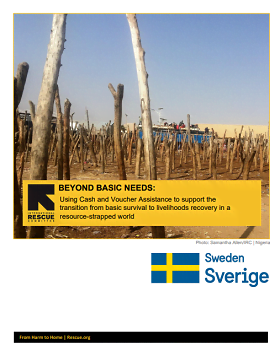
Beyond Basic Needs: Using Cash and Voucher Assistance to Support the Transition from Basic Survival to Livelihoods Recovery in a Resource-Strapped World
Guidelines and Tools
Do you think of yourself as a “cash” person OR as a “livelihoods” person? An “emergency” practitioner OR a “recovery” practitioner? Or do you find yourself unsatisfied with the often narrow implications of these terms? We’ll never have enough funding to provide basic needs support to everyone who needs it for the entire time they are in need, even if we take advantage of the...

Looking into 2020: short overview on global clusters, CVA and the CALP Network
Presentation
Overview as 2020 begins:
• Significant progress and commitment from all global clusters on integration of CVA into their work.
• Significant interest in different regions and by some donors on sector-specific CVA.
• Challenges that remain:
o Dialogue: 1) Ensuring CVA specialists understand sector specificities and successfully bank on the technical expertise emanating...

Building Evidence to inform the Effective Use of CASH and Voucher Assistance in Emergency Sanitation and Hygiene Programming
Report
An analysis of 5 case studies of utilization of CASH/Voucher Assistance are presented and analysed in the attempt of building evidence on their utilization in emergency WASH Sanitation and HP programming. Findings and recommendations are provided on Coordination, Situation and Response Analysis, Program Design, Implementation, Monitoring and Evaluation.
Últimos recursos

DG ECHO Thematic Policy Document on Cash Transfers
Policy paper
DG ECHO released its Thematic Policy document on Cash Transfers in March 2022. The document provides guidance primarily to DG ECHO’s partners and staff, but also to the wider cash community with the objective of collectively enhancing the quality and efficiency of cash programmes and of humanitarian...
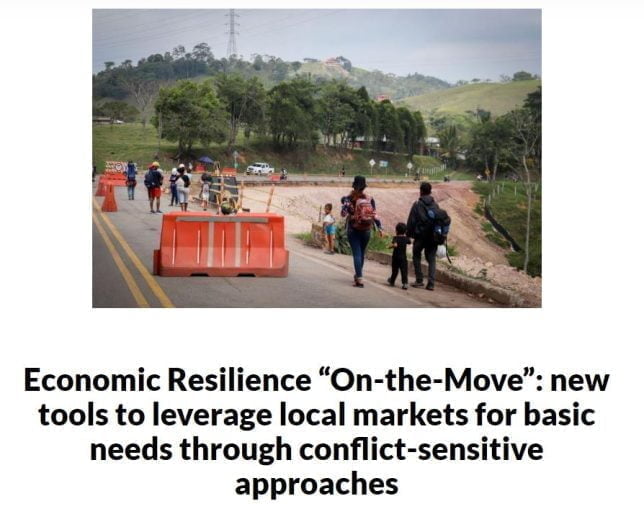
Economic Resilience “On-the-Move” – New Tools to leverage local markets for basic needs through conflict-sensitive approaches
Guidelines and Tools
See the publication here A special look at Cash and Local Markets for Social Cohesion Local market actors affected by (natural) disasters, pandemic lockdowns with movement restrictions and income loss – generally in Fragile Contexts – play a critical role in contributing towards communities’ basic...

Financial Services In The Uganda Refugee Response – An Assessment Of Users’ Perspectives
Report
This assessment of user experiences and perspectives on digital financial services and assistance mechanisms aims to inform actors in Uganda’s humanitarian response and other stakeholders. The data collected is representative at the settlement level for refugees and at district level for refugee hosting...

Uganda Refugee Response Cash And Voucher Assistance (CVA) User Perspectives – Research Brief
Report
This brief presents the summarised findings of the study on Financial Services and Humanitarian Mechanisms in the Uganda Refugee Response: An Assessment of User Perspectives in Uganda.
The assessment intends to inform actors and key stakeholders in Uganda’s refugee response about peoples’ existing...

Women and Girls Choose: Cash Assistance in GBV Case Management Saves Lives
Policy paper
As part of a coordinated response to gender-based violence (GBV), UNFPA and its partners provide a structured GBV case management process to survivors that can include referrals to medical, legal and other specialised services. This process provides a follow-up to challenges that a survivor may be facing,...

The Role of Cash and Voucher Assistance in Increasing Equity and Inclusion for Girls and Children with Disabilities in Education in Emergencies
Report
The Global Education Cluster (GEC) has been working to build the evidence base around cash and voucher assistance (CVA) in education in emergencies (EiE), resulting in the publication of the “Cash and Voucher Assistance for Education in Emergencies Synthesis Report and Guidelines” in 2019. This report...
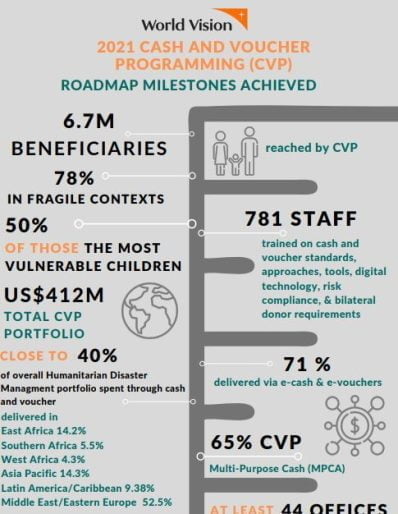
2021 Cash And Voucher Programming (CVP) Roadmap Milestones Achieved
Report
Summary Report of World Vision’s global progress report and milestones (against WV’s global Cash Roadmap Strategy) in Cash Voucher Assistance (Cash Voucher Programming-CVP) facilitated by World Vision in over 44 countries, reaching more than 6.7 Mio vulnerable people (78 % in Fragile Contexts) in...
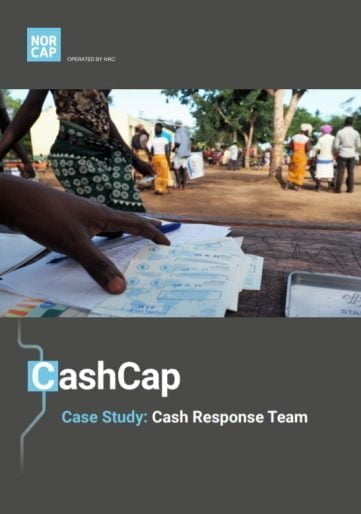
Case Study: Cash Response Team
Report
This case study explains well the role of a CashCap Response Team member. They are readily available to quickly scale up support for cash and voucher assistance where needed. This is especially crucial for a response to a rapid-onset disaster, or if there is a critical capacity gap supporting a Cash...
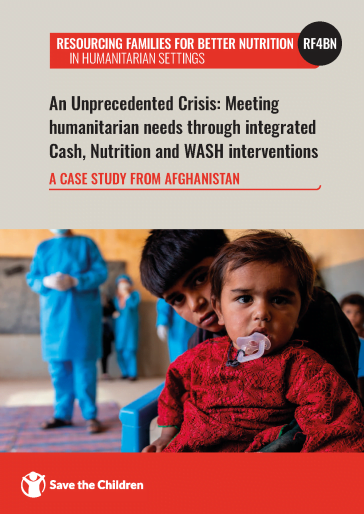
An Unprecedented Crisis: Meeting Humanitarian Needs through Integrated Cash, Nutrition and WASH Interventions. A Case Study from Afghanistan
Case Study
This case study is one of a series of three. They were produced by Save the Children UK within the cross country learning initiative on ‘Resourcing Families for Better Nutrition (RF4BN) in humanitarian settings’, implemented in 2021 and 2022 in Afghanistan, South Sudan and Yemen.
The case study...
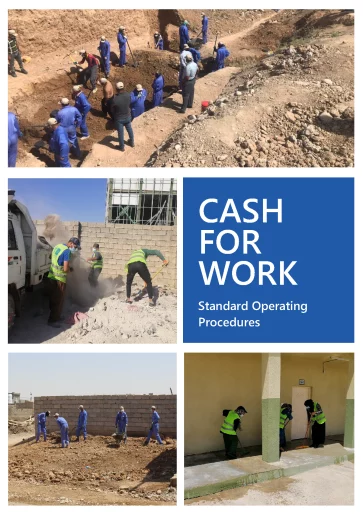
Cash for Work: Standard Operation Procedures
Guidelines and Tools
The humanitarian crisis in Iraq is one of the largest, with the fastest displacement rate since 2014. Vulnerable population in Iraq include both the recent and long-term displaced, those who remained in conflict areas, those who returned to newly liberated areas (NLAs), and communities hosting displaced....

HNO and HRP Process – CVA quality checklist
Guidelines and Tools
The use of Cash and and Voucher Assistance Assistance (CVA) has increased considerably in the past years, from 10.6 per cent of international humanitarian assistance in 2016 to 19 per cent in 2020. Today, CVA is widely recognized as a more flexible and dignified modality for providing humanitarian...

Applying the Common Approach ‘Resourcing Families for Better Nutrition’ in Humanitarian Responses. Cross-Country Learning Report
Report
From 2021 to 2022, Save the Children implemented ‘Cash + for Nutrition’ in programming in three countries at risk of famine: Afghanistan, South Sudan, and Yemen.
With funding from Save the Children Italy and technical support from Save the Children UK and the consulting firm InformEd International,...
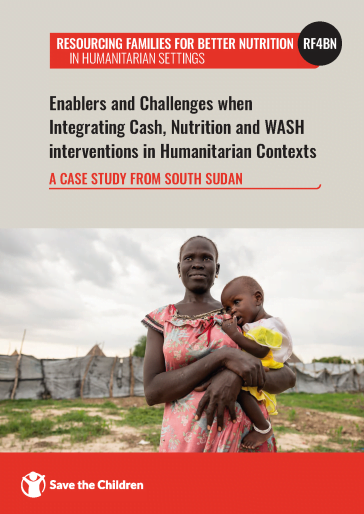
Enablers and Challenges when Integrating Cash, Nutrition and WASH Interventions in Humanitarian Contexts: A case study from South Sudan
Case Study
This case study is one of a series of three. They were produced by Save the Children UK within the cross-country learning initiative on ’Resourcing Families for Better Nutrition (RF4BN) in humanitarian settings’, implemented in 2021 and 2022 in Afghanistan, South Sudan and Yemen.
Focused on South...

Making humanitarian cash programming easier, safer and faster through the 121 Platform
Presentation
Better Cash Information Management and improved systems and tools can address the gap for humanitarian organisations and increase cash program quality and scale. The 121 Platform offers this solution with a Humanitarian Organisation Portal, Aid Worker App and Person Affected App. With the 121 Platform, we...
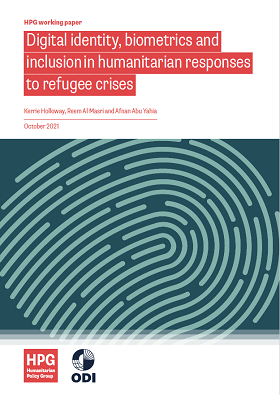
Digital identity, biometrics and inclusion in humanitarian responses to refugee crises
Report
Digital identity and biometrics have long been divisive topics in the humanitarian sector. On the one hand, they have the potential to be more inclusive and reach people in need at scale due to perceived efficiency gains. A legal identity for everyone as part of the Sustainable Development Goals (SDGs)...

Cost-efficiency Analysis: Conditional cash for education and protection
Case Study
This case study summarizes an analysis conducted by CARE using the Dioptra tool to generate cost-efficiency estimates for Conditional Cash for Education and Protection in Jordan. The analysis revealed that: Conditional Cash for Education and Protection cost $1,474 per child on average, across nine...

Intervención basada en el mercado de WASH
Guía y herramientas
El propósito de este documento es proporcionar una guía práctica sobre la programación basada en el mercado (MBP) en las respuestas humanitarias de WASH. Esta guía está destinada a: Profesionales humanitarios de WASH Profesionales de efectivo y mercados Equipos de apoyo empresarial humanitario que...
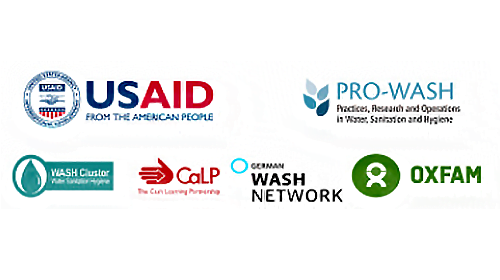
New Guidance: Market-Based Programming in WASH: Technical Guidance for Humanitarian Practitioners
Webinar
Over recent years, humanitarian aid organizations have increasingly used market-based programming (MBP) to deliver water, sanitation and hygiene (WASH) in emergencies. ‘Market-based modalities’ include the distribution of cash and vouchers, which enable recipient households to access the WASH goods...
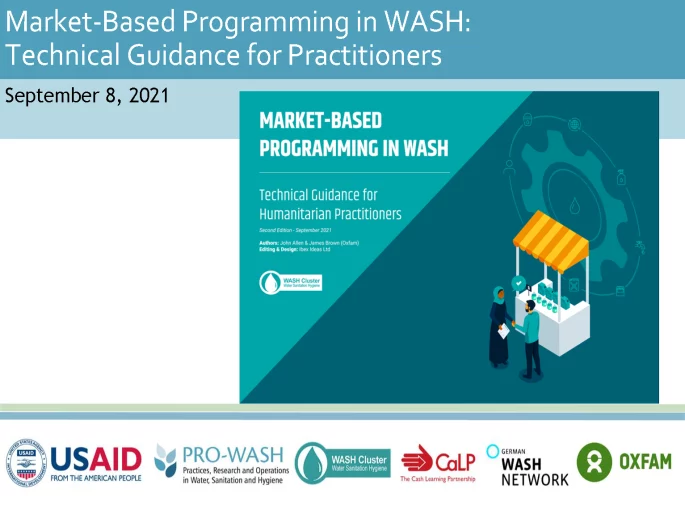
Market-Based Programming in WASH: Technical Guidance for Practitioners
Webinar recording
This webinar was co-hosted by the Global WASH Cluster, PRO-WASH, Oxfam, the German WASH Network and the CALP Network in September 2021. Over recent years, humanitarian aid organizations have increasingly used market-based programming (MBP) to deliver water, sanitation and hygiene (WASH) in emergencies....

Use of Cash and Voucher Assistance for Health Services
Guidelines and Tools
The use of Cash and Voucher Assistance (CVA) as a modality for providing humanitarian assistance has expanded rapidly in recent years. Arguments for the use of CVA to address several needs and facilitate people’s access to them include greater flexibility, cost-efficiency and dignity. There is extensive...


